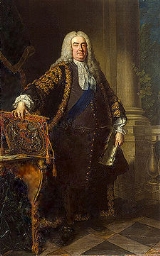
Robert Walpole
Overview
Robert Walpole, 1st Earl of Orford, KG
, KB
, PC (26 August 1676 – 18 March 1745), known before 1742 as Sir Robert Walpole, was a British
statesman
who is generally regarded as having been the first Prime Minister of Great Britain
.
Although the position of "Prime Minister" had no recognition in law or official use at the time, Walpole is nevertheless acknowledged as having held the office de facto
because of his influence within the Cabinet
.
A Whig who was first elected in 1701, Walpole served during the reigns of George I
and George II
.
Order of the Garter
The Most Noble Order of the Garter, founded in 1348, is the highest order of chivalry, or knighthood, existing in England. The order is dedicated to the image and arms of St...
, KB
Order of the Bath
The Most Honourable Order of the Bath is a British order of chivalry founded by George I on 18 May 1725. The name derives from the elaborate mediæval ceremony for creating a knight, which involved bathing as one of its elements. The knights so created were known as Knights of the Bath...
, PC (26 August 1676 – 18 March 1745), known before 1742 as Sir Robert Walpole, was a British
Kingdom of Great Britain
The former Kingdom of Great Britain, sometimes described as the 'United Kingdom of Great Britain', That the Two Kingdoms of Scotland and England, shall upon the 1st May next ensuing the date hereof, and forever after, be United into One Kingdom by the Name of GREAT BRITAIN. was a sovereign...
statesman
Statesman
A statesman is usually a politician or other notable public figure who has had a long and respected career in politics or government at the national and international level. As a term of respect, it is usually left to supporters or commentators to use the term...
who is generally regarded as having been the first Prime Minister of Great Britain
Prime Minister of the United Kingdom
The Prime Minister of the United Kingdom of Great Britain and Northern Ireland is the Head of Her Majesty's Government in the United Kingdom. The Prime Minister and Cabinet are collectively accountable for their policies and actions to the Sovereign, to Parliament, to their political party and...
.
Although the position of "Prime Minister" had no recognition in law or official use at the time, Walpole is nevertheless acknowledged as having held the office de facto
De facto
De facto is a Latin expression that means "concerning fact." In law, it often means "in practice but not necessarily ordained by law" or "in practice or actuality, but not officially established." It is commonly used in contrast to de jure when referring to matters of law, governance, or...
because of his influence within the Cabinet
Cabinet of the United Kingdom
The Cabinet of the United Kingdom is the collective decision-making body of Her Majesty's Government in the United Kingdom, composed of the Prime Minister and some 22 Cabinet Ministers, the most senior of the government ministers....
.
A Whig who was first elected in 1701, Walpole served during the reigns of George I
George I of Great Britain
George I was King of Great Britain and Ireland from 1 August 1714 until his death, and ruler of the Duchy and Electorate of Brunswick-Lüneburg in the Holy Roman Empire from 1698....
and George II
George II of Great Britain
George II was King of Great Britain and Ireland, Duke of Brunswick-Lüneburg and Archtreasurer and Prince-elector of the Holy Roman Empire from 11 June 1727 until his death.George was the last British monarch born outside Great Britain. He was born and brought up in Northern Germany...
.
Unanswered Questions
Quotations
All those men have their price.![]()
Reported in Bartlett's Familiar Quotations, 10th ed. (1919), stating "'All men have their price' is commonly ascribed to Walpole", and citing Coxe, Memoirs of Walpole, Vol. iv, p. 369: "Flowery oratory he despised. He ascribed to the interested views of themselves or their relatives the declarations of pretended patriots, of whom he said, 'All those men have their price'".
Anything but history, for history must be false.![]()
Walpoliana, No. 141.
The gratitude of place-expectants is a lively sense of future favours.![]()
Reported in Bartlett's Familiar Quotations, 10th ed. (1919), stating "Hazlitt, in his Wit and Humour, says, 'This is Walpole’s phrase'". Compare: "La reconnaissance de la plupart des hommes n'est qu'une secrète envie de recevoir de plus grands bienfaits" (translated: "The gratitude of most men is but a secret desire of receiving greater benefits"), François de La Rochefoucauld, Maxim 298.

